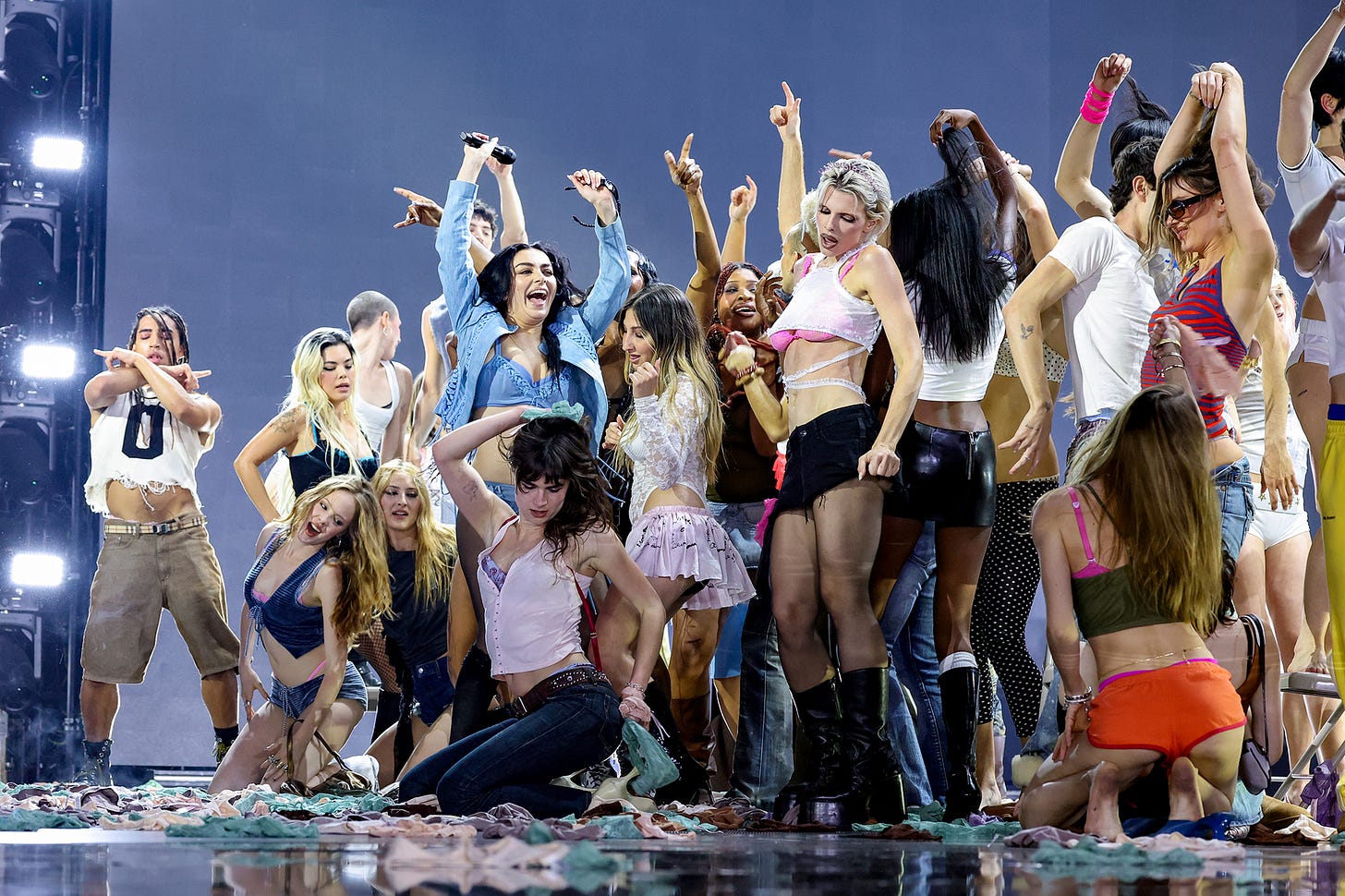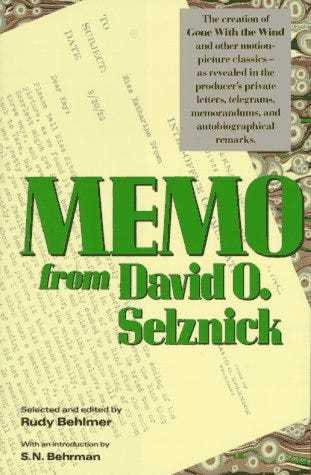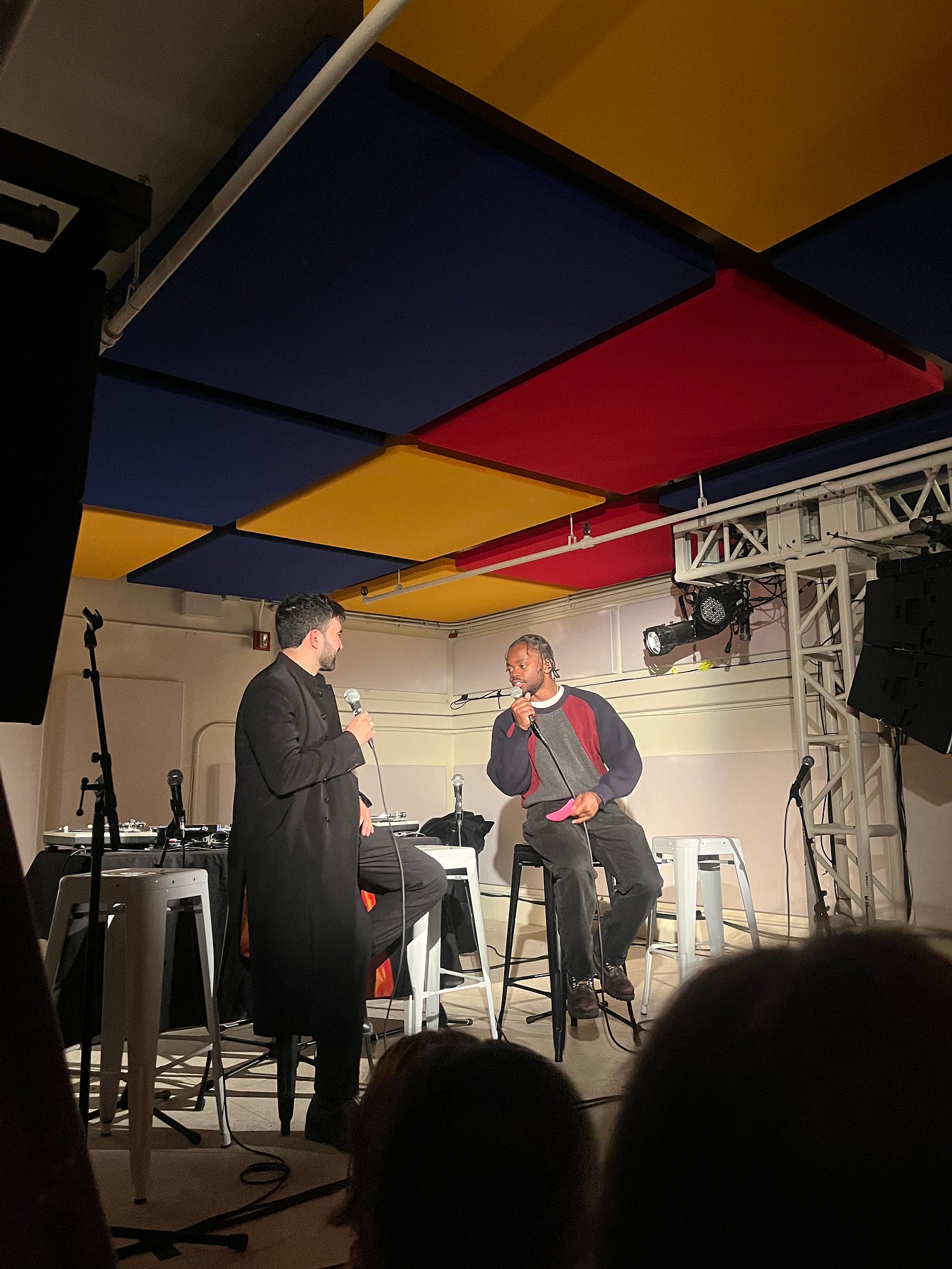No one asked, but the reason this blog is fashioned as a series of “memos” is a reference to early Hollywood producer David O. Selznick. Selznick famously made most of his deals in memo-form, rather than face to face or over the phone, because he was, in his own words, “self-conscious about [his] youth and in giving orders and expressing [him]self verbally, but dictating permitted [him] to hide behind the front of what I liked to think were impressive memos.” He was also generally a “social disaster,” according to Michael Powell.
When I somewhat briefly (2.5 years?) worked as a “creative development executive” (IMO the film industry equivalent of a curator), someone recommended I read Memo from David O. Selznick, a book that collects many if not all of these notes. I love this book, and I love the memo format. I too am often self conscious in person. I can speak in front of large crowds with relative ease, but negotiating face to face stresses me out, and my impulse to be nice often overtakes my desire to get what I want. Reading Selznick’s memos took the edge off of diving headfirst into working in the film industry–even though the company I was working for was sort of at the fringe of the action, and had one foot in art.
So, David O. Selznick is the patron saint of neurotic but high-achieving business-people everywhere, and strangely, of this blog, which has nothing to do with making deals.
I finally went to Eel Bar this weekend, with my friend Chris Danis. Some menu items, like the fried bass and the shrimp skewer, were really great. Others–the grilled tuna–were sort of flat. I guess I prefer a broader spread of quality amongst dishes to an overall middling experience. But the whatever-ness of the tuna, and okay also of the trout, stung after two great starters. Also there was so much vermouth in my martini that I had to send it back, and I never do that. But I’d say 8/10 holistically. Elevated to 8 by the interior, staff, and the fact that they didn’t rush us out when we were the last people in there.
For the last few months I’ve been working on co-organizing a fundraiser for mayoral candidate Zohran Mamdani. It was this Sunday at Nightclub101 and was crazy-packed and very ~uplifting~. As part of the program, I moderated a panel on “Culture and the Contemporary Left” featuring Brace Belden,
, Ciaran Finlayson, and Kay Gabriel. We talked about a lot in a short period of time. Some takeaways: Kay made some great points about people on the left being trained to see liberals as their primary antagonist or enemy, but as things in the Western World are trending back toward fashy, the fight is no longer against someone who pretends to care about you but takes action that causes you harm (liberals); it’s now a fight with people and institutions that won’t even pretend they give a fuck. Separately, Josh mentioned how in the last few years there was a shift from the mentality that you could sort of live anywhere and do your work, have your little career, but more recently people have had to just move back to city centers that are not sustainable in basically any regard, in order to maintain their work/lifestyle. Ciaran pinned down that in and around 2020 some major political gains were made, and since then there have also been some major losses; but it was good to highlight that the last decade has not been an uninterrupted slide into Hell. I liked Brace’s last word, which I think was sort of the thesis of the party in my book: the petit bourgeoisie’s situation may appear indeterminate, sometimes we seem rich sometimes we seem poor, we enjoy the spoils of capital and love eating at cool new restaurants and trying to get free clothes blah blah (my words) but when push comes to shove it is with the working class we must side.Zohran spoke and fielded some questions from the event’s MC Jordan Coley and the audience. A lot of the questions were about city finances, and it was honestly quite moving to hear random people speak intelligently about what’s happening in the city. No Twitter brain IRL. Just real shit. People danced. Open bar ran out super fast. There was a line all the way down 7th street. Read some more about it on
’s Feed Me. More press forthcoming. Keep donating and get involved!My takeaway: Maybe the boring and stupid era of being bogged down in personality politics veiled as identity politics, worrying about how someone relates to the political is ending. It seemed like everyone at the party felt relieved to see their peers there, and to confirm for ourselves that whatever you call this community (art world? Not quite? Downtown? Eh…), it’s are not nearly as nihilistic as we let people say it is.
After the party, I was shocked to learn that Anora semi-swept the Oscars. I truly don’t understand the enthusiasm for this movie. It was fun, but I can’t make sense of the push to treat it as proper Cinema. In a New Yorker email blast, I saw that Naomi Fry said that the lesson of the night was “keep it indie.” I found this confusing, because doesn’t Sean Baker winning Oscars for his $6 million film (technically low-budget but this is part of a whole other thing where it is wild that the metrics for low and high budget filmmaking are what they are) that was made by Neon, one of the independent and technically not-studio-alliance but functionally-small-studio companies, mean that Baker is no longer indie, not that the Oscars have “gone indie” themselves?
**note: I published this and then was wracked with anxiety that people would read this and not understand that I know that “indie” is still an industry term used to refer to non studio pictures, and that on Sunday there were a lot of “indie” winners in this regard. My point above is partially that the delineation between “studio” and “independent” producer” is murky, benefitting somewhat from an antiquated studio system that separates the “Big 5” from the independents. But some of these independent producers wield quite a bit of power. Second, I mean that in Baker’s case “indie” is also being used to describe his films a la the way the word has been used since the 90s or 2000s to describe an “alternative” disposition within a given object or practice.**
This tracks with something I’ve been musing on with greater clarity recently (though it is still fuzzy)–related to the general drying-up of anything that resembles “subculture” throughout the West: The impossibility of insurgency, culturally or politically, into the mainstream. People have been talking about this in a variety of lanes. In Josh’s recent Doomscroll episode with Will Menaker (who hosted the Oscars portion of the party on Sunday), Menaker talks about how hopes of changing the Democratic party from within are basically shot; like the radical left infiltrating just didn’t really work. I’m seeing this in film, music, and art as well.
Taking some liberties and adding my own spin to a conversation I had over the weekend: An example of this might be Charli XCX coming from the “underground” via PC Music, but 1) Charli already being the more mainstream end of the projects coming out of that scene 2) As was voiced by someone in this conversation, there being an ickiness to her successes after Sophie’s premature death, when many already felt like Charli was downstream of Sophie’s genius, that feeling became more sinister when Sophie passed (R.I.P). 3) Whether or not you agree with points one and two, it’s undeniable that Charli XCX’s bringing whatever the complex of aesthetic-cultural pseudo-positions one could gather using words like “downtown” “indiesleaze” “2021 vibes” fully into the mainstream does nothing to challenge mainstream culture (counterexample: early hip-hop? punk?), and certainly does nothing to shift its structural dynamics. It just offers the vague aura of subculture up on a platter. All to say, there’s no possibility of detourning, scrambling, etc. (Admittedly, it’s hard to really pin down where in this process something is getting hollowed out though; Like I don’t believe that “brat” instrumentalizes or co-opts a look/lifestyle that actually exists as a real formation; if anything, the slow suctioning out of anything Real begins at the PC Music stage of Charli.)
Another example of this might be the Kendrick Lamar Super Bowl thing, which I’m allergic to writing about at length, though I do have a lot of thoughts about it. What I’ll say is that like Charli XCX, Lamar offers the broadest possible audience a shell of a subcultural or subversive performance-object. I don’t mean “shell” in a derisive, idiomatic sense, but an outer casing that would need to be filled with something but is, in fact, not. In the case of Kendrick Lamar, the subcultural-thing is blackness, and much like with Charli (subcultural-thing with her being, possibly, “sex”?) the thing is pantomimed, and the performers and audience go through the motions of a fake conflict of ideals. At the Grammys, it seems we are supposed to be scandalized by the low-slung jeans and the making out. At the Super Bowl, we are supposed to find risky the Sam Jackson Uncle Sam and crip-walking, as though we have not all done this before, together, and walked away unscathed. With Charli and sex, which I think is the thing that we’re being told she represents, we seem to be expected to forget about all of the actually very sexy and scandalizing moments in American popular culture that have impacted our relationship to sex, sexiness, and like, being hot in public. Like even the 2003 Britney Spears, Christina Aguilera, and Madonna VMAs kiss, or the Janet Jackson nip slip in 2004. These events are equally unreal as ‘brat’-does-the-Grammys–arguably even more staged and controlled–but they’re somewhat more risque, more theatrical.

Beyond the impossibility of like doing anything interesting in the mainstream. . .counter-culture? Is that what I’m talking about? It seems that basically no one has any desire to maintain marginality or in vibier terms, the off-kilter-ness of a scene, style, project, etc. Worse than the center having effectively turned the margins to feeder-climates or like off-world mining colonies, is the fact that it seems like everyone wants to be in the center. And the center wants everyone, as long as you let it have you.
In closing, I found it interesting that these industries also want everyone to continue to appear marginal and subcultural, a la “Oscars go Indie.” I suppose the mainstream gets its fuel from maintaining these somewhat imaginary boundaries. Extraction, baby. It’s also like how there were A&R people at the Dissensus show at Earth on Friday night. Maybe we’re entering another period of full court press from the “mainstream” (2021 was sort of that way maybe? Also, damn, I hate saying “mainstream.” It makes me sound Gen X). But uh, yeah. Extraction, baby. Draft season, baby.
I’m reminded of Deleuze & Guattari on “minor literature,” which they characterize as deterritorializing, political, and endowing everything with collective value.
“The three characteristics of minor literature are the deterritorialization of the language, the connection of the individual and the political, the collective arrangement of utterance. Which amounts to this: that "minor" no longer characterizes certain literatures, but describes the revolutionary conditions of any literature within what we call the great (or established)”
Somewhere else in the book, they talk about the minor as also being dedicated to staying minor.
The pieces of writing that I have encountered about this are focused on Kafka and Carmelo Bene, respectively. I think dear friend Arto Lindsay (Hi, Arto!) might have put me onto the Deleuze on Bene. Here is the Kafka essay. And the Bene one is in the Deleuze Reader.
When I was writing this today, I got lost in re-reading the Deleuze and happened upon a section that brings my post full-circle:
“[Marco] Montesano remarks, "[Italian cinema] is a cinema of institution, despite the conflictual appearances, for the conflict filmed ("mis en scene") is the conflict which the institution foresees and controls." It is a theater and a cinema that are narcissistic, historicist, and moralizing. The same for the rich as for the poor: [Carmelo Bene] describes them as belonging to the same system of power and domination that divides them into "poor slaves" and "rich slaves," and where the artist has the function of an intellectual slave, on one side or the other. But just how is one to exit from this situation of conflictual, official, institutionalized representation?”
Yeah, just how is one to exit from this situation of conflictual, official, institutionalized representation?





